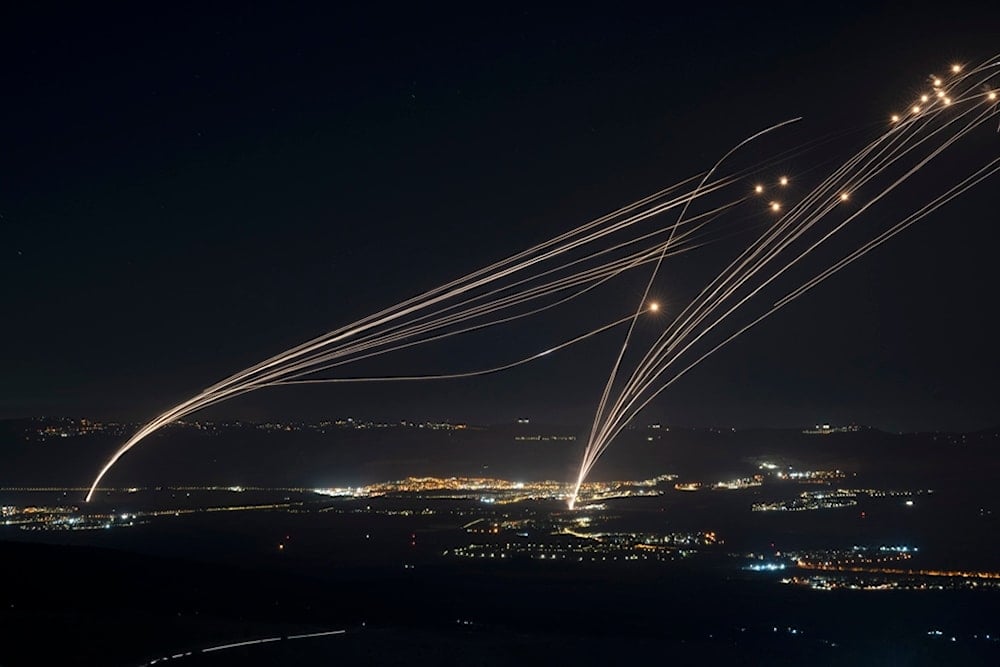Foreign Policy: 'Israel's' existential fears exacerbate its aggression
Foreign Policy stressed that "Israel" is living an existential threat that it has never known before, and attributes its excessive aggression in the last ten months to this reason.
-

The Israeli Iron Dome air defense system fires to intercept an attack from Lebanon over the Galilee region as seen from the Israeli-occupied Syrian Golan Heights, Sunday, August 4, 2024. (AP)
"Israel", as it always has taken an aggressive military stance towards its enemies, has become more lethal in the last ten months, according to the American journal Foreign Policy, which argues that the reasons for this go beyond what "Israel's" harshest critics say in terms of destroying the last vestiges of Palestinian nationalism and committing genocide against the Palestinians, emphasizing that the real explanation for this increased aggression is more complex.
Foreign Policy pointed out that the Israeli occupation felt that their existence was no longer at risk after 1967, and this developed with the involvement of Arab countries in the project of normalization and recognition of the existence of "Israel", and was accompanied by economic growth and increased foreign investment.
One of the practical effects of this view, according to Foreign Policy, was the decrease in defense spending in the early 1990s, and "Israel's" abandonment of the first of the three pillars of its "defense" strategy, "victory in war," allowing the second pillar, "deterrence," to erode, and its excessive reliance on the third pillar alone, "intelligence."
The journal recognized that "Israel's" wars with unconventional forces have never ended in a decisive victory, since the 1980s. That said, its ability to deter its enemies has diminished, as evidenced by Hamas's willingness to fight a repeated war against "Israel" since 2008, and instead of decisive victory and effective deterrence, "Israel" has become increasingly reliant on "defensive measures" such as walls, fences, and high-tech early warning systems.
"Israel" paid a heavy price for these policies on October 7, 2023, as Iran and its allies realized the magnitude of the occupation's failure, both intelligenceally and organizationally.
The journal explained this trajectory, starting with Hezbollah launching attacks across the northern border just one day after Operation Al-Aqsa Flood, and the firing of Yemeni missiles and drones at shipping vessels in the Red Sea and at "Israel" itself, until last April when Iran for the first time launched a direct attack with missiles and drones against "Israel".
The journal argued that the "total victory" promised by Israeli occupation Prime Minister Benjamin Netanyahu is unlikely to be achieved at all against Hamas, let alone Hezbollah or Iran, pointing out that restoring "Israel's" ability to deter is a more realistic goal, but it is not a pain-free goal either, in the face of organizations that are ideologically committed to eliminating Israel from existence, it is not enough to "demonstrate effective defensive capabilities."
Moreover, Foreign Policy revealed that "Israel's" recent actions are dangerous and disproportionate for policymakers and public opinion in the United States and Europe, who cannot deny that it risks igniting a regional war, but they realize that it does not have very good options.
The journal recalled that "Israel" is small "in terms of population, geography, and economy, and cannot afford to be surprised, fight long wars, or maintain a tight defensive posture indefinitely," noting that it is fully aware that "for every new friend it has in the region, it has a stubborn enemy."
The journal further indicated that the psychological impact of the October 7 operation was profound for Israeli settlers and a tangible reminder that the threat to "Israel's" existence is not just empty talk by its enemies and the consequences of a brief moment of failure to secure the border were dire.
Months of bombarding the North with Hezbollah rockets, drones, and anti-tank missiles, in addition to Iranian missile strikes, gave the Israeli occupation an idea of "how the end might come," Foreign Policy added.
Read more: Probe confirms Israeli military using Palestinians as human shields

 4 Min Read
4 Min Read








